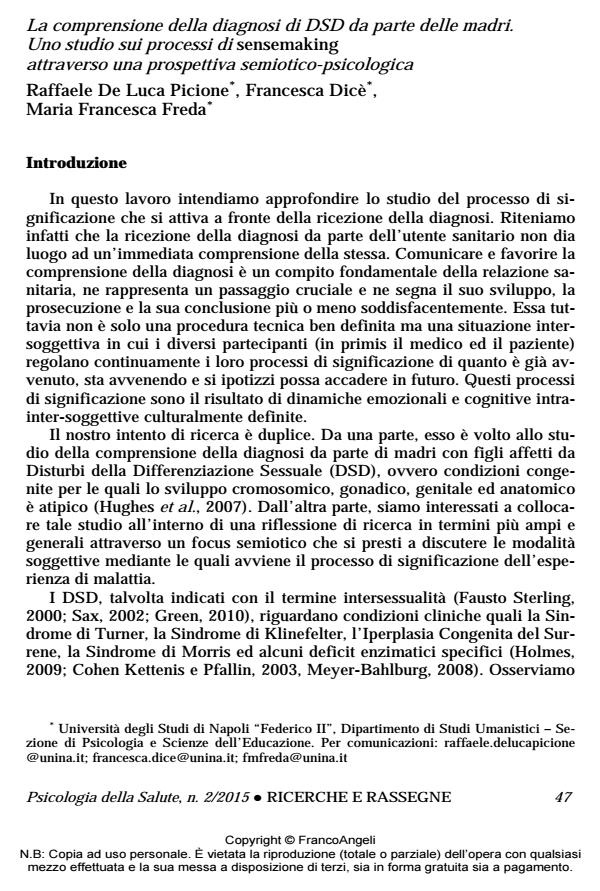La comprensione della diagnosi di DSD da parte delle madri. Uno studio sui processi di sensemaking attraverso una prospettiva semiotico-psicologica
Titolo Rivista PSICOLOGIA DELLA SALUTE
Autori/Curatori Picione Raffaele De Luca, Francesca Dicé, Maria Francesca Freda
Anno di pubblicazione 2015 Fascicolo 2015/2
Lingua Italiano Numero pagine 29 P. 47-75 Dimensione file 130 KB
DOI 10.3280/PDS2015-002004
Il DOI è il codice a barre della proprietà intellettuale: per saperne di più
clicca qui
Qui sotto puoi vedere in anteprima la prima pagina di questo articolo.
Se questo articolo ti interessa, lo puoi acquistare (e scaricare in formato pdf) seguendo le facili indicazioni per acquistare il download credit. Acquista Download Credits per scaricare questo Articolo in formato PDF

FrancoAngeli è membro della Publishers International Linking Association, Inc (PILA), associazione indipendente e non profit per facilitare (attraverso i servizi tecnologici implementati da CrossRef.org) l’accesso degli studiosi ai contenuti digitali nelle pubblicazioni professionali e scientifiche.
Gli autori discutono il processo di significazione della malattia ed in particolare la ricezione della diagnosi in termini semiotici e psicologici. Viene presentata una ricerca qualitativa sul processo di significazione da parte di madri con figli che hanno ricevuto diagnosi di Disturbi della Differenziazione Sessuale (DSD). Viene osservato e discusso come il processo di significazione della esperienza di malattia e della diagnosi si configuri come un’esperienza di crisi e di rottura della continuità delle proprie esperienze. Il lavoro degli autori si articola in una prospettiva dichiaratamente semiotica, luogo di un possibile e fecondo incontro tra la psicologia culturale e la psicologia clinica dinamica, in cui viene considerata la mediazione tra istanze soggettive, intersoggettive e culturali. In tale prospettiva viene presentata e discussa la possibilità di ricercare nel testo delle interviste dei genitori, marcatori linguistici attraverso cui vengono definiti i posizionamenti e le modalità soggettive dei processi di significazione della diagnosi, della mediazione intra-inter-soggettiva, delle modalità specifiche di confrontarsi con i significati culturali, e della relazione tra la continuità e discontinuità generata dalla crisi di senso della malattia.
Parole chiave:Disturbi della Differenziazione Sessuale, processo di significazione della diagnosi, esperienza di malattia come discontinuità semiotica, marcatori linguisti di soggettività
- Mirroring in Group Counseling: Analyzing Narrative Innovations Giovanna Esposito, António P. Ribeiro, Miguel M. Gonçalves, Maria Francesca Freda, in Small Group Research /2017 pp.391
DOI: 10.1177/1046496417697149 - Possible use in psychology of threshold concept in order to study sensemaking processes Raffaele De Luca Picione, Maria F Freda, in Culture & Psychology /2016 pp.362
DOI: 10.1177/1354067X16654858 - Psychological functions of semiotic borders in sense-making: Liminality of narrative processes Raffaele De Luca Picione, Jaan Valsiner, in Europe’s Journal of Psychology /2017 pp.532
DOI: 10.5964/ejop.v13i3.1136 - The experience of living with a chronic disease in pediatrics from the mothers’ narratives: The Clinical Interview on Parental Sense of Grip on the Disease Livia Savarese, Maria Francesca Freda, Raffaele De Luca Picione, Pasquale Dolce, Raffaella De Falco, Maria Alessio, Mauro Cancian, Adriana Franzese, Maria Domenica Guarino, Roberto Perricone, Angelica Petraroli, Riccardo Senter, Claudia Traverso, Andrea Zanichelli, Eugenio Zito, Maria Bova, in Health Psychology Open 2055102920971496/2020
DOI: 10.1177/2055102920971496 - Lo Scaffolding psicologico per la presa in carico delle condizioni Intersex/DSD. I Setting di Ascolto Congiunto Francesca Dicé, Maria Auricchio, Valentina Boursier, Raffaele De Luca Picione, Fabiana Santamaria, Mariacarolina Salerno, Paolo Valerio, Maria Francesca Freda, in PSICOLOGIA DELLA SALUTE 1/2018 pp.129
DOI: 10.3280/PDS2018-001008 - Le trasformazioni dialogiche delle preoccupazioni in Pediatria di Famiglia: un'indagine empirica Francesca Dicé, Assunta Maiello, Pasquale Dolce, Maria Francesca Freda, in PSICOLOGIA DELLA SALUTE 3/2017 pp.74
DOI: 10.3280/PDS2017-003004 - Modal articulation: The psychological and semiotic functions of modalities in the sensemaking process Raffaele De Luca Picione, Maria Luisa Martino, Maria Francesca Freda, in Theory & Psychology /2018 pp.84
DOI: 10.1177/0959354317743580 - The Dynamic Nature of the Human Psyche and its Three Tenets: Normativity, Liminality and Resistance—Semiotic Advances in Direction of Modal Articulation Sensemaking Raffaele De Luca Picione, in Human Arenas /2021 pp.279
DOI: 10.1007/s42087-021-00212-3 - Idiographic Approach to Health Maria Francesca Freda, Raffaele De Luca Picione, Jensine Nedergaard, Sergio Salvatore, pp.1 (ISBN:978-1-64113-427-9)
- Foundation of Ethics-Based Practices Raffaele De Luca Picione, Maria Francesca Freda, Livia Savarese, pp.115 (ISBN:978-3-030-83665-8)
- Stress and Psychological Factors in the Variable Clinical Phenotype of Hereditary Angioedema in Children: A Pilot Study Maria Francesca Freda, Livia Savarese, Maria Bova, Anna Galante, Raffaella De Falco, Raffaele De Luca Picione, Gianni Marone, Angelica Petraroli, Gerarda Siani, Paolo Valerio, Massimo Triggiani, in Pediatric Allergy, Immunology, and Pulmonology /2016 pp.6
DOI: 10.1089/ped.2015.0557 - Sensemaking Process of Parents of Children with Autism Spectrum Disorder: Identification of Specific Clusters of “Sense of Grip” Raffaele De Luca Picione, Maria Francesca Freda, Roberto Bianco, Francesca Capelli, Angelo Maria De Fortuna, Barbara Dioni, Chiara Fante, Cinzia Raffin, Simone Rollo, Gina Troisi, Carmelo Sandomenico, Alessandro Musetti, in Human Arenas /2024
DOI: 10.1007/s42087-024-00406-5 - Meaning-making process related to temporality during breast cancer traumatic experience: The clinical use of narrative to promote a new continuity of life Maria Luisa Martino, Maria Francesca Freda, in Europe’s Journal of Psychology /2016 pp.622
DOI: 10.5964/ejop.v12i4.1150
Picione Raffaele De Luca, Francesca Dicé, Maria Francesca Freda, La comprensione della diagnosi di DSD da parte delle madri. Uno studio sui processi di sensemaking attraverso una prospettiva semiotico-psicologica in "PSICOLOGIA DELLA SALUTE" 2/2015, pp 47-75, DOI: 10.3280/PDS2015-002004